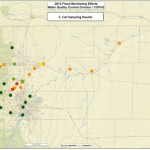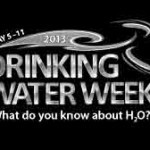The Colorado Department of Public Health and Environment has released more information about water safety and quality after severe flooding last month. Sampling shows no evidence of pollutants from oil and gas spills in rivers and streams affected by the flooding. The department collected samples at 29 sites in eight different rivers. They showed high levels of E. coli in some areas of the South Platte Basin. The highest concentrations were found in Boulder Creek and Big Thompson River watersheds. The presence of E. coli indicates that human and animal bacteria from untreated sewage is in the water in those areas. Thankfully, outbreaks of communicable diseases or E. coli illnesses have not been reported. Five public drinking water systems are still on no boil and/or bottled water … [Read more...]
Consumer Groups Sue EPA for Withdrawing Clean Water Act Rule
The Humane Society of the United States (HSUS), the Center for Food Safety, Environmental Integrity Project, Food & Water Watch, and Iowa Citizens for Community filed a lawsuit last week against the Environmental Protection Agency for withdrawing a rule that would have allowed the government to collect information from factory farms. The rule would have required CAFOs, or Concentrated Animal Feeding Operations, to comply with the protective standards of the Clean Water Act. There are about 20,000 CAFOs in the United States, and they produce three times as much waste as humans. EPA does not require those facilities to meet waste management and treatment requirements, even though the animal waste released into the environment contains pathogens, heavy metals, antibiotics, and … [Read more...]
Antibiotic Resistant Bacteria in Hudson River
A study published in the Journal of Water and Health has found that the Hudson River in New York contains antibiotic-resistant bacteria from untreated sewage water. The bacteria are resistant to tetracycline and ampicillin and were detected at all 10 sampling sites along the river. This study was the first to document widespread distribution of antibiotic-resistant bacteria in the Hudson River Estuary (HRE) and to demonstrate a link between the abundance of antibiotic-resistant bacteria and levels of sewage-associated bacteria in an estuary. The heaviest concentrations of these dangerous pathogens were in Yonkers and near La Guardia airport, where sewage water is being released into the river. About 27 billion gallons of waste water is released into the Hudson ever year. Hurricane Sandy … [Read more...]
Minnesota Report Finds Agriculture Responsible for Most Nitrate Pollution
A report by the Minnesota Pollution Control Agency found that nitrogen in surface waters, a possible human health issue, is caused by agricultural runoff. Levels are particularly high in southern Minnesota. More than 70% of nitrates in surface water come from cropland. Anhydrous ammonia is used as a fertilizer on farm fields. Drain tiles, which carry away excess water that can cause crops to rot, carry the chemical to streams and rivers. The nitrate then travels downstream, where a huge dead zone of oxygen-deprived water has formed in the Gulf of Mexico. Nitrate consumption can cause methemoglobinemia, or "blue baby syndrome", in which infants develop a blue-gray skin color and become irritable or lethargic. This condition can cause death if not quickly treated. Some adults who are … [Read more...]
It’s Drinking Water Week, Get to Know Your H2O
The theme of this year’s Drinking Water Week is: What Do You Know About Your H2O? For many Americans, the answer to that question is not much, but it’s never too late to learn and it’s the goal of Drinking Water Week. Created 35 years ago by the American Water Works Association (AWWA), Drinking Water Week is a public awareness campaign that encourages consumers to think about their sources of drinking water, how they use it and how to protect it in the future. In the U.S., utilities that provide drinking water to communities are required to monitor and test it for contaminants multiple times each day and provide customers with water quality reports annually. Owners of private wells should havie their water tested periodically by a certified laboratory. Consumers can get information … [Read more...]









